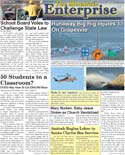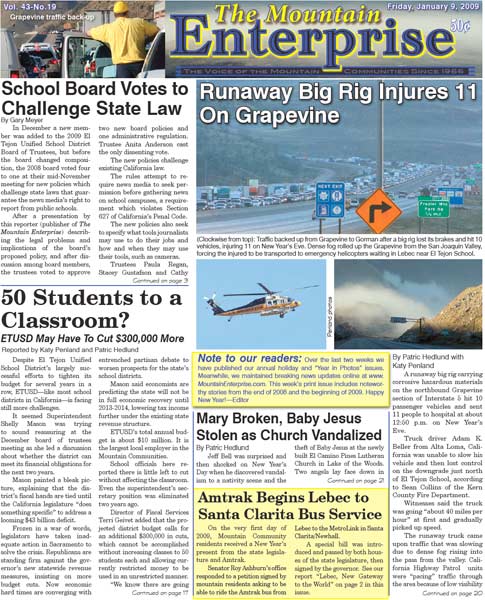By Gary Meyer
In December a new member was added to the 2009 El Tejon Unified School District Board of Trustees, but before the board changed composition, the 2008 board voted four to one at their mid-November meeting for new policies which challenge state laws that guarantee the news media’s right to report from public schools.
After a presentation by this reporter (publisher of The Mountain Enterprise) describing the legal problems and implications of the board’s proposed policy, and after discussion among board members, the trustees voted to approve two new board policies and one administrative regulation. Trustee Anita Anderson cast the only dissenting vote.
The new policies challenge existing California law.
The rules attempt to require news media to seek permission before gathering news on school campuses, a requirement which violates Section 627 of California’s Penal Code.
The new policies also seek to specify what tools journalists may use to do their jobs and how and when they may use their tools, such as cameras.
Trustees Paula Regan, Stacey Gustafson and Cathy Wallace said the reason for the policy revision was “to protect the kids” from having strangers “wandering around on campus.”
Current school board president Ken Hurst said that trustees should approve the new media policy. He said he and Superintendent Shelly Mason “had spent much time discussing the issues” and that he had talked with California Newspaper Publishers Association (CNPA) Legal Counsel Jim Ewert about the proposed policies.
In fact, Hurst sent a draft to Ewert for his comments, to which Ewert responded in an email on November 10, 2008, saying, “The proposed policy would require media representatives like all other visitors to register immediately upon entering a campus. As we discussed, this provision would violate state law…”
In 2006 The Mountain Enterprise provided the ETUSD school board with a detailed explanation of how the district’s proposed policy would violate state laws and unnecessarily subject the district to significant legal and financial risk.
California Penal Code Section 627 restricts access on public school property for “outsiders.” Section 627 then points to seven classifications of people who cannot be considered “outsiders” and who are granted privileges by the legislature to enter and remain on school grounds without permission, in the public interest. One of those seven classifications is news media. Inquiry by the 2008 board into the legal consequences for the school district was limited to Trustee Anderson’s question, “Has this proposed policy been seen by the school district’s lawyers?”
Superintendent Mason responded, “No. I’ve tried four times and I’m not having much success getting them to comment on it.” Mason said she had called other school districts and one had told her, ‘We just use the sample policies from CSBA.’”
CSBA (California School Boards Association) is a private non-profit organization that provides school districts with a wide range of resources and provides sample policies which school boards often adopt. ETUSD’s new policies were adapted from CSBA sample policies, but modified by the board.
ETUSD’s law firm is Schools Legal Services, based in Bakersfield.
A document viewed at Schools Legal Services’ website on November 15, titled “Memo 17,” appears to be a guide for school districts to understand school property access issues. It quotes portions of state law saying that news media are exempt from the “outsider” classification.
The new ETUSD policy appears to attempt to skirt the law by employing the word “visitors” instead of “outsiders.”
ETUSD Board President Hurst said, “I suggest we pass this [policy] now and then have the superintendent send it down to Schools Legal and ask them if they’re willing to defend it.”
After Trustee Anderson expressed concern that the school district could be sued and said the board should first have the district’s lawyers examine the draft policy, Trustee Cathy Wallace appeared to become irritated, saying, “Anyone who would threaten to sue this school district should be ashamed!”
Legal costs for school districts taken to court for violating state or federal laws can exceed $100,000. Costs can climb significantly higher if the court awards the plaintiff attorney’s fees and damages.
Representing the interests of The Mountain Enterprise and the public we serve, this reporter informed the Board of Trustees that The Mountain Enterprise does prefer to register its presence on school grounds when it is reasonable to do so, but circumstances could arise under which reporters may not register their presence on campus and, at those times, would follow their rights under state laws to enter and remain on campus to report newsworthy events to the public without obtaining permission from administrators.
In a private conversation with Hurst, The Mountain Enterprise said, “No one wants a crisis on one of our school campuses to affect the safety of the students. But if such a thing happens, we and other media will not be checking in at the school office, we have to go where the news is happening. The public will need and want to know from an independent source what is happening on campus.
“California law provides for news media to be that source, independent of school administrators.”
The board was informed that in such circumstances— should the school personnel attempt to interfere with the right of The Mountain Enterprise reporters to do their jobs as provided under state laws—then, regretfully, costly legal action could result.
This is part of the January 09, 2009 online edition of The Mountain Enterprise.
Have an opinion on this matter? We'd like to hear from you.


